Nutan : A Flashback - The Friend
Nutan entered the film industry the year I was born. So, in a way, I have never known life without Nutan. And in that early, impressionable age, when as a child, films looked big and film stars as elusive and adultory as Gods and Goddesses, Nutan was going through her first and most memorable phase. She had always been there, smiling out of film magazines or staring at me from film hoardings. And Seema (1955), Sone Ki Chidiya (1958), Sujata (1959) and Anari (1959), all happened in the first ten years of my life and her career That she was a relative (not too close) and a Maharashtrian made me look upon her with more affection and admiration than Nargis, Geeta Bali, Madhubala or Meena Kumari. Years later, when I had a more objective outlook and could discern good from the best, the affirmation that my childhood choice or favourite was indeed the best of the lot, gave me more satisfaction. For, look at the variety of her roles and the versatility with which she played them. Her face had a chiselled beauty, her figure slim and tall. She could well have played glamorous roles, but she shunned them. She was rarely seen in anything but a saree, a long plait and gold earrings. This simplicity of hers, I liked best. Nutan was the first art-film actress who was a star with a great commercial pull.
Simple. That's how I remember her when I saw her in person for the first time. When I was nine, I was taken to the Bombay Hospital to see Mrs Padmavati Samarth who had an accident. Just as we were about to leave, Nutan walked in, in a simple salwar-kurta to meet her kaki. As we drove home, I saw the hoardings of Anari in the adjacent Liberty cinema. It was a coincidence a nine-year-old never forgets. She caught my glance as it travelled from the hoarding to her face. I couldn't forget the smile or the pat she gave a wide-eyed child.
Over the years, I had often seen her driving her car, dressed in plain clothes, her hair tied up in a pony-tail, working hard or shopping at the Crawford Market. But the first time I met her was 23 years after the Bombay Hospital incident. Her son, Mohnish, had become a model and at my request she had arranged an interview and a photo-session with him. We went up the winding road to the Parsik tunnel past forests to a large cowshed somewhere in Mumbra, which was her farm. Atop the hill was a castle-like bungalow with tiger skins on the walls palatial furniture all around. Glass panelled windows overlooked the Mumbra creek on one side and the distant smoking chimneys of suburban Bombay and Thane could be seen from the other. Nutan greeted me warmly and within minutes family ties were traced. Our common mother tongue helped in establishing instant rapport. It felt as if we had known each other all our lives. It remained so till the end. A kind of bond that defies description, a confidence I shared which is too sacred to reveal. She confided in me her fears, thoughts, worries, family problems and feuds. We had innumerable nice warm chats which are too personal, too sacred for me to reveal, now or ever.
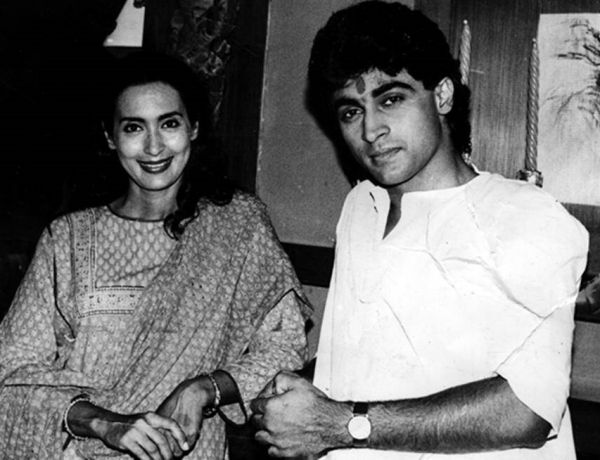
In the nine years that Nutantai and I remained friends, the age difference disappeared, so did a star and a journalist relationship. It was a wonderfully warm and sweet bond that made me admire her more as a woman. She was a courageous and active person, a practical and no-nonsense friend, rather than a star. A nostalgic dream that happened in real life. If it lessened the ethereal aura or the image of a shining star, it was a loss that enriched me. Because it gave me insight into a sensitive, sober and a multitalented human being, I shall cherish always.
On this Saturday afternoon, which turned into evening and now night, I gathered my impressions, feelings, encounters observations with a great personality who was a simple soul. Perceptions deepened, hidden facets of her personality suddenly emerged. Her delicate quivering emotion-soaked voice resonates as I recall so many incidents she told me. They unveil a life embellished with achievements she never boasted of. She was a writer, poetess, thinker and a philosophic woman. Her autobiography would have been a chronicle of the forty years of Indian cinema, that cover perhaps its golden period. Let me tell you her own story in her own words, as she told me over the years.
"I got a lot very early in life. I feel I have achieved everything at the right time, but I have managed to maintain it a little while longer than many. With actors or actresses, it's a fade-out or a fade over to another category in 15 years time. I was a leading lady for over thirty years and my transition was gradual and smooth. Yes. I do feel a sense of achievement. But the credit doesn't go entirely to me. Luck had a big hand in it.I must admit I've had it easy, though.
"I remember very vividly—I couldn't have been more than two years old then—I got a frightful electric shock. I had poked a screwdriver with a yellow handle into a plug-point!! I howled, got my parents hysterical. I love gadgets and to this day I like tinkering with them. My husband calls me 'my gadget-wife'!
"I started training in Kathak at the age of three and in Hindustani classical music at five. In fact, I was three years old when I started being a part of a variety musical programme with singers like Juthika Ray.
"My father, was a writer, a poet, a filmmaker who was very gentle and soft-spoken. Once, I was complaining, that my ayah was not making the doll's dress correctly. He heard me, sat on the floor and cut the dress out himself. I was so happy. He taught me Marathi and Sanskrit. He was such a spontaneous poet that at every family wedding, after the bride had finished the naav ghena, they would expect an ukhana from him. And he would never fail to amuse and make all the people laugh. A few years later, when my mother was in the U.S., I was sent to Bangalore to Baldwin Girl's High School. I hated the food and felt so lonely that my father came and took me back to Bombay by plane. That was my first flight and I was frightened. All through, he kept reassuring me, "it's like going up on the swing." I didn't get to be with him for too long. My parents separated and I met my father rarely. A few months before he died, when he was ill, I got to be close to him. I wish I had spent more time with him. It is one regret and guilt, I can never get over. Not only because I couldn't be the daughter I would have liked to be, but the immense loss that I felt on not being able to spend more years of my life with such a warm, caring and brilliant man. He could have enriched my life so much.
"I wasn't proud, but rather pleased about being recognised as Shobhana Samarth's daughter. Once during a school show, a teacher who was dressing me up, suddenly said, 'you look like Shobhana Samarth. Are you related to her?' I stammered, 'S..s ..she's my mother' Years later, my mother met someone in Europe and asked her if she was related to an Indian actress called Nutan!
"I used to visit my mother on the sets. So, the world of lights, cameras and studios was not alien to me. That's why when I did my first film at the age of fourteen, it seemed like a natural step. A couple of years later, I did Nagina (1951) with Nasir Khan. A very amusing thing happened when I went to see this film with my family at Super cinema. The usher stopped me as I was under eighteen and the film had got an 'Adult' certificate. Only when the theatre manager was called, did they realise that I was the film's heroine and they allowed me in.
"I was terribly thin and within the industry there was a joke that if you want to draw Nutan, just draw a straight line. My mother even feared that perhaps I had TB. So at seventeen, despite the fact that I had so many film offers, my mother sent me to a finishing school in Switzerland.
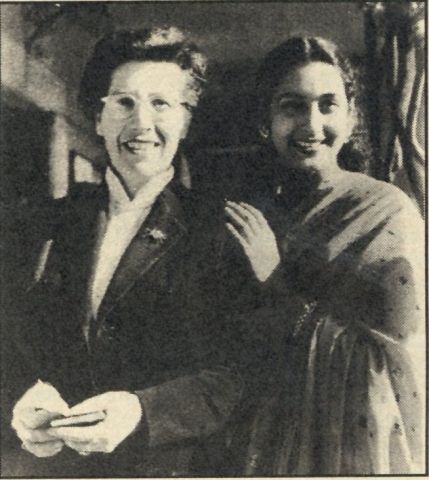
"The one year that I spent in Switzerland was the happiest in my life. I could play, study, be free and catch-up with what I missed in my teenage years. I did a secretarial course which has paid dividends several times over. I do my typing, accounts, tax matters, every clerical job required to keep my money matters straight. I learnt French, which I can still speak and write. When I returned to India, I was forty pounds heavier and then began a wonderful phase.
"Seema was a serious film where I played a teenage delinquent. We used to have great fun on the sets. I remember, Amiyada (Chakravarty) rang me up after the first show at Eros and said, 'angel, you have done it!" 'Done what?' I asked. It has clicked. People have loved it.' If only Amiyada had lived longer, we would have made more films of different kinds. He had such plans...
"You won't believe this, but when people ask me about rivalry amongst actresses then, I can truly say that we were genuine friends. We rang each other up, met socially and even went to each other's homes. I remember Nargis, Geeta Bali and Meena Kumari were actually protective towards me as I was a baby then. At parties or delegations, they would take care of me. If at all, this is one thing you don't see much today. Of course, the closest friend I made among heroines was Shubha Khote. We did several films together.
"Sujata, I thought would be my last film, as I was getting married and naturally presumed that house and family would take precedence. But Rajnish said, 'if you were a painter or a writer, I wouldn't have asked you to stop your work and I won't, although you are an actress. Continue, by all means, but do fewer films, choose your roles.'
"Being a naval officer's wife was a different experience. I hardly socialised or went to film parties. It was just work and home, before marriage. But now, we had naval ship, parties and what have you. Our socialising increased. Almost every night we'd be out.
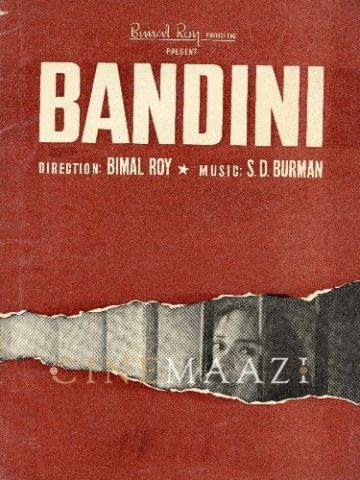
"Bimalda's ideas were always interesting. When he narrated Bandini (1963) I liked it and accepted the offer. We never knew that we were working on a 'classic' or a great subject. We worked normally without any extra fuss. Nobody made a big fuss about the awards either. In fact none of us went to the Karlovy Vary Festival. Bimalda had sent Basu Bhattacharya, his son-in-law, to the festival and when I was adjudged the best actress there, he picked up the trophy which is still with him. I haven't even seen it.
"My career has been long and extremely satisfying. I shunned gossip all throughout and even managed to succeed to an extent. Except for two incidents which really caused massive scandals and caused me great pain. One, was the rift between my mother and me, when I took her to court for mismanaging my funds. It was a very hard decision for me to take. Yes, I had expected the reaction: `How can a daughter take her mother to the court?' But that didn't make the conflict any easier to bear. Yet, I had to do it to protect the future of everyone concerned.
Anyway since 1983, all is well between the two families.
"My slapping Sanjeev Kumar became a much-talked-about incident. He made a very careless, irresponsible statement about having an affair and that made me furious. I have never been linked with scandals and when he said what he did, I flew off the handle. I had to put him in his place. After I said what I had to, I cooled down and said, 'let's finish the love scene', and we did.
"I loved doing Saraswatichandra (1968) and even the South Indian films like Milan (1967), Khandan (1965) and years later Main Tulsi Tere Angan Ki (1978). When Saawan Kumar asked me to do Saajan Ki Saheli (1980), after Saajan Bina Suhaagan (1978), I agreed. It was a negative role, but what difference does it make to an actress? I've never understood that. An actor should strive for variety, that's all. Because that will ensure his growth. I remember having a long argument, which continued for several days, with Javed Akhtar, during the making of Meri Jung (1985). I said I would love to do the role of a widow, who once her kids grow up and settle down in life, remarries. He said, the public would never accept it. I fail to see why. That's life, it happens. It's a pity that our makers are not willing to look at life as it is in reality. Films like Aakrosh (1980), Ankur (1974), Ardh Satya (1983) will influence the thinking of our filmmakers, our films. At the same time, people who talk about 'our good old days' and decry violence, are wrong. Films have to change. They have to reflect contemporary society. There are many issues, which would provide more material to our writers and directors if they care to look and expand their horizons.
"I have been a keen observer of film techniques. I want to direct a film. That's an ardent wish. Because the film is a director's medium after all. I even suggested the idea to Jaya (Bachchan), but her response is not clear. Rajshri films have given me a clear signal, though.
"Times gone by always seem more rosy. But the old yields place new and there is always something good in every age.
Nutan played the role of Majhubi, a widow who was in the business of making jaggery in the film Saudagar, starring opposite Amitabh Bachchan
Unfortunately, Nutan never did eventually direct. She wanted to do off-beat roles, like the ones she did at the peak of her career, roles that opened the way for Shabana and Smita. Towards the end, to use her analogy, she felt that despite her ability to cook Chinese, Mughlai and continental food she was only being asked to cook daal bhaat. "I am going to close accounts after what I am doing now." she'd say. How prophetic! For, within months of her telling me this, she had to undergo an operation. It was discovered that she had cancer. Few knew that she visited the producers' office to return the signing amounts and bowed out of their films.
I have never heard her talk about her illness. Till almost the time she was admitted to the hospital, we talked over the phone regularly. I sent her a cassette of Asha Bhosle and Hridaynath Mangeshkar's Marathi songs. She called me up to thank me and said, "it's been years since I heard these songs. When you meet Ashatai give her a hug from me." In her last years, she had become a satsangi. The word 'Om' meant a lot to her. She composed bhajans, sang them and despite the pain, she died with the conviction that her soul would merge with God after it fled the body.
Actress, star celebrity, writer and a good human being– that was Nutan. She has bequeathed a legacy of unforgettable films. To me, she has left a possession of priceless photographs and invaluable memories of time spent together.
This article was written by Gautam Rajadhyaksha originally published in the Junior G supplementary of March 1992 issue called Nutan : A flashback. The images used are taken from the original article, Cinemaazi archive and the internet.




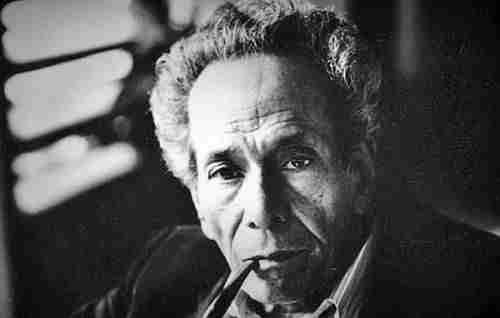
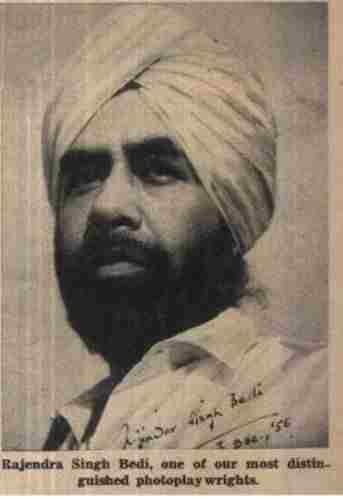
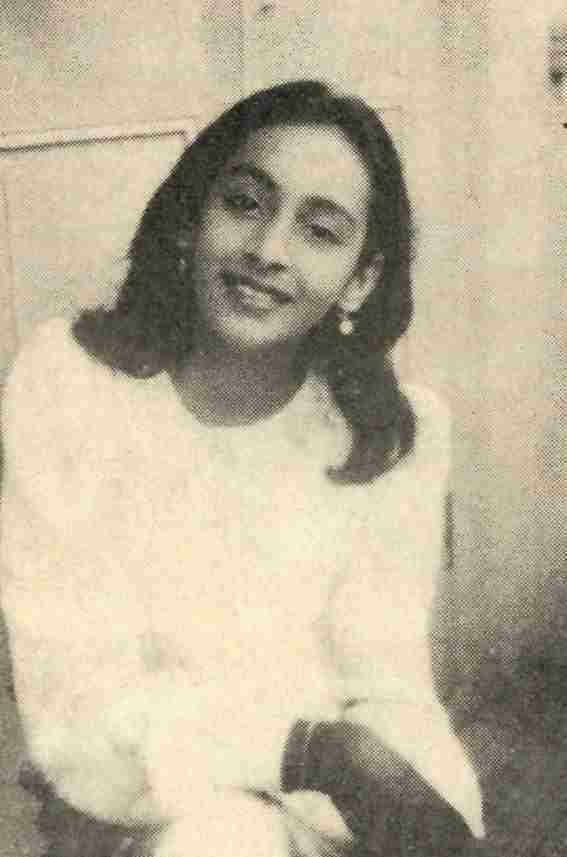
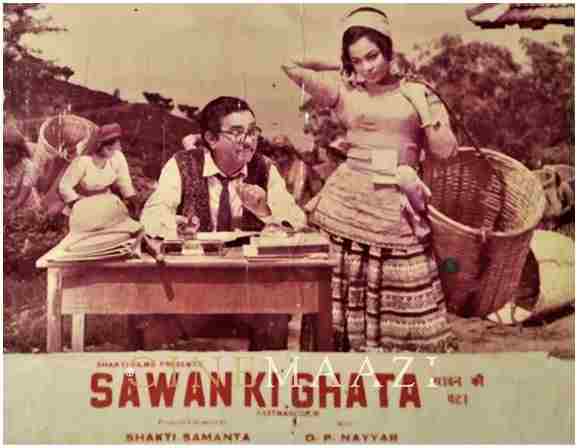
.jpg)


